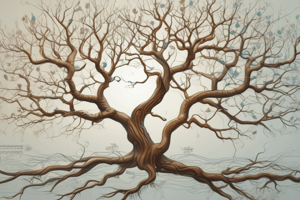Podcast
Questions and Answers
What is the scientific study of life and living organisms?
What is the scientific study of life and living organisms?
- Biology (correct)
- Chemistry
- Geology
- Physics
Which branch of biology studies the interactions between organisms and their environment?
Which branch of biology studies the interactions between organisms and their environment?
- Molecular biology
- Microbiology
- Ecology (correct)
- Botany
What is the basic structural and functional unit of life?
What is the basic structural and functional unit of life?
- Tissue
- Organ
- Molecule
- Cell (correct)
What is the process by which cells make proteins?
What is the process by which cells make proteins?
What is the study of heredity and variation?
What is the study of heredity and variation?
What is the change in the frequency of alleles in a population over time?
What is the change in the frequency of alleles in a population over time?
What is the community of living and non-living components interacting in an environment?
What is the community of living and non-living components interacting in an environment?
What is the relationship between two organisms in which one benefits and the other is harmed?
What is the relationship between two organisms in which one benefits and the other is harmed?
Flashcards are hidden until you start studying
Study Notes
Definition and Branches of Biology
- Biology is the scientific study of life and living organisms, including their structure, function, growth, evolution, distribution, and taxonomy.
- Branches of biology:
- Botany: study of plants
- Zoology: study of animals
- Microbiology: study of microorganisms
- Ecology: study of interactions between organisms and their environment
- Molecular biology: study of biological molecules and their interactions
- Biochemistry: study of chemical processes in living organisms
Cell Biology
- Cell: basic structural and functional unit of life
- Cell components:
- Plasma membrane
- Cytoplasm
- Nucleus
- Mitochondria
- Ribosomes
- Cellular processes:
- Photosynthesis
- Respiration
- Cell division (mitosis and meiosis)
- Protein synthesis
Genetics
- Genetics: study of heredity and variation
- Key concepts:
- DNA (deoxyribonucleic acid): genetic material
- Genes: units of heredity
- Alleles: different forms of a gene
- Genotype: genetic makeup of an individual
- Phenotype: physical and behavioral characteristics of an individual
- Mendel's laws:
- Law of segregation
- Law of independent assortment
- Law of dominance
Evolution
- Evolution: change in the frequency of alleles in a population over time
- Mechanisms of evolution:
- Natural selection
- Genetic drift
- Mutation
- Gene flow
- Evidence for evolution:
- Fossil record
- Comparative anatomy
- Molecular biology
Ecosystems and Ecology
- Ecosystem: community of living and non-living components interacting in an environment
- Ecological levels:
- Individual
- Population
- Community
- Ecosystem
- Biosphere
- Ecological relationships:
- Predator-prey
- Symbiosis (mutualism, commensalism, parasitism)
- Competition
- Decomposition
Definition and Branches of Biology
- Biology is the scientific study of life and living organisms, encompassing their structure, function, growth, evolution, distribution, and taxonomy.
- Botany studies plants, while Zoology focuses on animals, Microbiology explores microorganisms, Ecology examines interactions between organisms and their environment, Molecular Biology delves into biological molecules and their interactions, and Biochemistry investigates chemical processes in living organisms.
Cell Biology
- A cell is the fundamental structural and functional unit of life.
- Cell components include:
- Plasma membrane: regulates what enters and leaves the cell
- Cytoplasm: site of metabolic reactions
- Nucleus: contains genetic material
- Mitochondria: generates energy for the cell
- Ribosomes: site of protein synthesis
- Cellular processes involve:
- Photosynthesis: converts light energy into chemical energy
- Respiration: generates energy from glucose
- Cell division (mitosis and meiosis): creates new cells
- Protein synthesis: creates proteins from amino acids
Genetics
- Genetics is the study of heredity and variation.
- Key concepts include:
- DNA (deoxyribonucleic acid): the genetic material
- Genes: units of heredity
- Alleles: different forms of a gene
- Genotype: an individual's genetic makeup
- Phenotype: an individual's physical and behavioral characteristics
- Mendel's laws govern inheritance:
- Law of segregation: each gene separates during gamete formation
- Law of independent assortment: genes separate independently during gamete formation
- Law of dominance: a dominant allele masks the effect of a recessive allele
Evolution
- Evolution is the change in allele frequency in a population over time.
- Mechanisms of evolution include:
- Natural selection: favors individuals with advantageous traits
- Genetic drift: random change in allele frequency
- Mutation: changes in DNA sequence
- Gene flow: exchange of genes between populations
- Evidence for evolution comes from:
- Fossil record: shows gradual changes in species over time
- Comparative anatomy: reveals similarities and differences between species
- Molecular biology: shows genetic similarities and differences between species
Ecosystems and Ecology
- An ecosystem consists of living and non-living components interacting in an environment.
- Ecological levels include:
- Individual: a single organism
- Population: a group of individuals of the same species
- Community: multiple populations interacting in an environment
- Ecosystem: includes all living and non-living components
- Biosphere: encompasses all ecosystems on Earth
- Ecological relationships involve:
- Predator-prey interactions: one species feeds on another
- Symbiosis: mutualism (benefits both), commensalism (benefits one), and parasitism (harms one)
- Competition: species compete for resources
- Decomposition: breakdown of organic matter
Studying That Suits You
Use AI to generate personalized quizzes and flashcards to suit your learning preferences.



